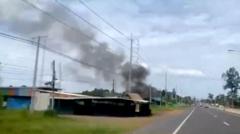Following a tragic attack that claimed 26 lives, tourism in Pahalgam, Kashmir is starting to recover slowly, but deep-rooted fears and tensions remain as locals and business owners worry about the long-term impacts on their livelihoods and safety.
After the Attack: A Fragile Return of Tourists to Pahalgam

After the Attack: A Fragile Return of Tourists to Pahalgam
In the aftermath of a deadly militant attack, Pahalgam cautiously welcomes back tourists, while fear and uncertainty loom over the region's healing process.
In the shadow of a recent and tragic militant attack that left 26 people dead, the town of Pahalgam in Indian-administered Kashmir finds itself in a precarious situation. Once buzzing with tourists, the area has begun to see a trickle of visitors returning, albeit in small numbers. The devastating attack occurred on a Tuesday when militants opened fire on tourists at Baisaran, a scenic spot often referred to as "the Switzerland of India." The aftermath has left shops boarded and hotels nearly deserted, creating an atmosphere of quiet desolation.
Despite two weekends having passed since the attack, the streets of Pahalgam are starting to come alive again with a few tourists venturing to explore the beautiful valley. Many, however, have expressed fear and panic following the shocking violence aimed at civilians, a rarity in recent years. Local businesses, heavily reliant on tourism, are bracing for a difficult period. Rafi Ahmed, a seller of traditional shawls, shared his anxieties about sustaining his livelihood, reflecting broader fears across the region.
Tourists who chose to stay are finding solace in the reassurances provided by locals and security forces. Bollywood actor Atul Kulkarni's visit post-attack aimed to encourage tourism, urging travelers not to cancel their trips as a way to counter the militants’ message. But despite these hopeful voices, uncertainty hangs over Pahalgam, with many fearing the long-term impact on their economy and the safety of visitors.
As tensions escalate between India and Pakistan over Kashmir, local leaders stress the importance of unity and resilience. The government has intensified its security operations in the aftermath of the attack, detaining individuals linked to the violence. Meanwhile, tour operators report a staggering cancellation rate of 80-90% for bookings, leaving both locals and businesses anxious about the future.
Kashmir was starting to glimpse the benefits of tourism recovery after a period of unrest, with millions of visitors arriving in previous years. The recent attack, however, casts doubt on whether the fragile peace can endure. A timely infrastructure project, the world’s highest single-arch rail bridge aimed at improving connectivity, faces delays amid the current climate of fear.
Pahalgam's chief minister has publicly mourned the victims, striving to assure safe visits in the future, while voicing his deep regret over the violence that marred the region's reputation. With the specter of potential conflict lingering, the residents of Pahalgam cling to hope that a return to normalcy and economic stability is on the horizon. Visitors may trickle back for now, but the path to recovery will be long and fraught with challenges ahead.
Despite two weekends having passed since the attack, the streets of Pahalgam are starting to come alive again with a few tourists venturing to explore the beautiful valley. Many, however, have expressed fear and panic following the shocking violence aimed at civilians, a rarity in recent years. Local businesses, heavily reliant on tourism, are bracing for a difficult period. Rafi Ahmed, a seller of traditional shawls, shared his anxieties about sustaining his livelihood, reflecting broader fears across the region.
Tourists who chose to stay are finding solace in the reassurances provided by locals and security forces. Bollywood actor Atul Kulkarni's visit post-attack aimed to encourage tourism, urging travelers not to cancel their trips as a way to counter the militants’ message. But despite these hopeful voices, uncertainty hangs over Pahalgam, with many fearing the long-term impact on their economy and the safety of visitors.
As tensions escalate between India and Pakistan over Kashmir, local leaders stress the importance of unity and resilience. The government has intensified its security operations in the aftermath of the attack, detaining individuals linked to the violence. Meanwhile, tour operators report a staggering cancellation rate of 80-90% for bookings, leaving both locals and businesses anxious about the future.
Kashmir was starting to glimpse the benefits of tourism recovery after a period of unrest, with millions of visitors arriving in previous years. The recent attack, however, casts doubt on whether the fragile peace can endure. A timely infrastructure project, the world’s highest single-arch rail bridge aimed at improving connectivity, faces delays amid the current climate of fear.
Pahalgam's chief minister has publicly mourned the victims, striving to assure safe visits in the future, while voicing his deep regret over the violence that marred the region's reputation. With the specter of potential conflict lingering, the residents of Pahalgam cling to hope that a return to normalcy and economic stability is on the horizon. Visitors may trickle back for now, but the path to recovery will be long and fraught with challenges ahead.



















